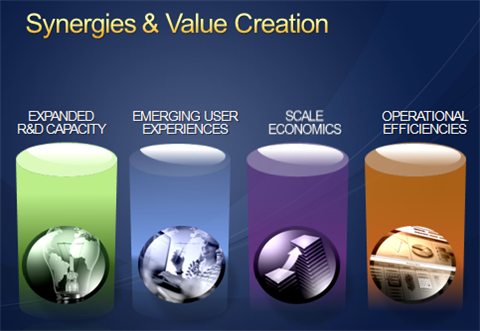Microsoft-Yahoo: Putting the moving parts together

First let's get the slides out of the way. On Microsoft's conference call executives dished out the following synergies (worth a low $1 billion in savings).
Exhibit A: The Value creation

The culture: There may a few cultural hurdles, but I think much of the worry is misplaced. Why? You can make a nice career hopping between Google, Yahoo and Microsoft. A lot of Yahoo managers probably have worked at Microsoft and vice versa. For instance,
The data centers: Both Yahoo and Microsoft have been talking up grid computing infrastructures and investing heavily in the data centers that would support these things. It's likely that these things will continue. What's unclear is what type of architecture will win out. When Yahoo reported its fourth quarter earnings president Sue Decker said:
"On the back end we have made a major investment in open source development of grid computing which provides a substantially greater scalability at fast iteration on core technologies. This is already dramatically impacting our competitiveness in algorithmic search and advertising."
If Microsoft seals the deal you'll have a nice internal open source tug of war.
The ad systems: Yahoo has
Email products: The combined company will have Hotmail, Outlook, Zimbra and Yahoo Mail. Initially these things will continue to operate separately but in the long run these products will blend together. Could Zimbra wind up in some Microsoft Live offering?
Search technology: Yahoo and Microsoft have both spent heavily in the search arms race only to play second and third fiddle to Google. These various search technologies--including Microsoft's recent purchase of FAST--will ultimately morph together. On the upside, enterprise search could benefit as these tools are combined.
Cross property integration: It would be a missed opportunity of properties like Flickr weren't connected to MSN. Ultimately, though there will be some hard decisions to make and some services that are decommissioned. What will happen to Maps, job listings and the like? How about mobile applications?
Update: Hitwise has posted more on the cross property integration items. Hitwise also has compiled a handy chart on the overlap.